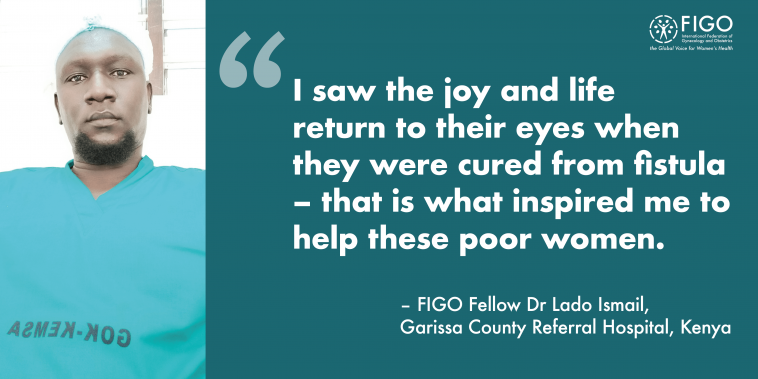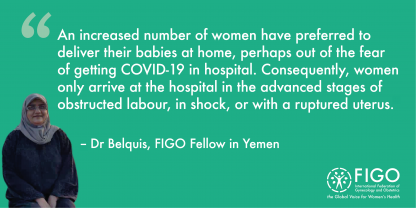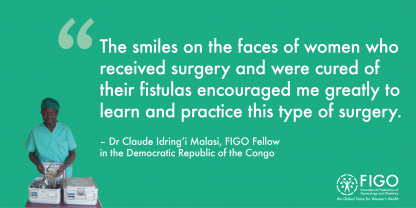Stories from FIGO's Fistula Fellows – Kenya

Obstetric fistula is a neglected public health and human rights issue. A devastating childbirth injury, it leaves women permanently incontinent and it is currently estimated that only 1 woman in 50 is able to access corrective treatment.
The FIGO Fistula Surgery Training Initiative is a globally recognised, pioneering programme offering training and education in fistula surgery. Our 67 trainee surgeons - ‘FIGO Fellows’- provide life-transforming care in some of the world’s most underserved regions, thereby helping to close the fistula treatment gap.
This month, we spoke to FIGO Fellow Dr Lado Ismail from Garissa County Referral Hospital in Kenya about his experience of being a fistula surgeon and what it will take to eradicate fistula by 2030.
In my early days of medical practice, I saw young girls and women suffering from the devastating social and economic effects of obstetric fistula. I saw how desperately they would wait for any visiting fistula surgeon to alleviate their suffering. I was not trained to handle fistula surgeries then, but many patients had been abandoned by their loved ones, so I supported them psychologically and financially until they could get help.
I saw the joy and life return to their eyes when they were cured from fistula - that is what inspired me to help these poor women.
A patient I cannot forget
One fistula patient that I cannot forget, is a young 15 year old girl who got an obstetric fistula during her first delivery, in which the baby did not survive. Her husband was the first to abandon her, followed by her family and she was falsely accused of having the HIV virus.
The smell of urine and social stigma meant that she lived in isolation. She avoided drinking water, hoping that the urine would stop, but she started suffering from recurrent urinary tract infections. Eventually she decided that she preferred to stay in the hospital, rather than in her village.
An ultrasound scan showed a huge bladder stone that we removed, and then we repaired her fistula. She went back to her family and husband, and two years later she delivered a baby boy through caesarean section. The baby was named Lado, in appreciation for restoring her dignity.
The impact of COVID-19
During the early months of the pandemic, there was a total decline in the number of women seeking health services, including fistula patients. One year down the line we have registered a considerable increase in deliveries, but also, sadly, an increase in obstetric complications and fistula, which is mostly attributed to the country lockdowns.
Being a FIGO Fellow
Being a fistula Fellow has been a good opportunity for me to get more specialised training and materials. It has also widened my network, so that I can communicate, consult and share experiences with other colleagues. Being a FIGO Fellow has also improved the quality of fistula services in our facility through the continued support and supply of materials from our partners, including FIGO, Fistula Foundation, AMREF, and Global One.
Eradicating obstetric fistula in 10 years, by 2030
Eradicating obstetric fistula is an achievable goal, but it requires the commitment of all stakeholders to:
- Encourage women and girls’ education and empowerment
- Increase midwifery training
- Train more fistula surgeons
- Integrate fistula treatment services into routine hospital programs
- Set laws and regulations that discourage harmful practices
Help FIGO to end obstetric fistula by donating to the FIGO Fistula Surgery Initiative as well as spreading the message on social media using our toolkit.


